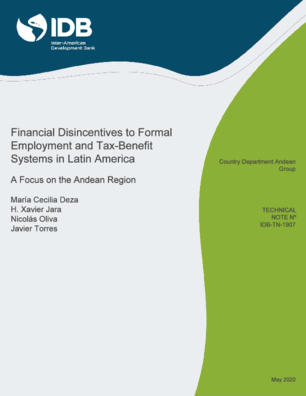Financial Disincentives to Formal Employment and Tax-Benefit Systems in Latin America
Date
May 2020
The aim of this paper is twofold. First, we provide a comprehensive assessment of the financial cost informal workers would incur in the event of entering formal employment in five Latin American countries: Bolivia, Colombia, Ecuador, Peru and Venezuela. Then, we analyze the extent to which formalizing informal workers would contribute to increase fiscal capacity in the region and assess the distributional implications of counterfactual entries to formal employment. Our results show a wide variation in financial disincentives to enter formal employment, with formalization tax rates ranging between 8.5 percent in Venezuela and 65 percent in Colombia. Formalization tax rates are particularly high for self-employed informal workers in all countries, and mainly driven by the high costs associated to social insurance contribution payments for this group. We further show that potential entries to formal employment would raise tax revenue in all countries but mainly through the effect of increased social insurance contribution payments, whereas personal income tax revenue would only increase marginally except in Bolivia and Venezuela. Interestingly, potential formalization of informal workers with the highest probability of being formal would allow capturing a substantial share of the additional tax revenue lost due to informality. In implementing formalization strategies, governments need to evaluate these potential fiscal gains against increased hiring costs for firms. In any case, there is evidence that formalization have positive effects in productivity and long-term growth.




